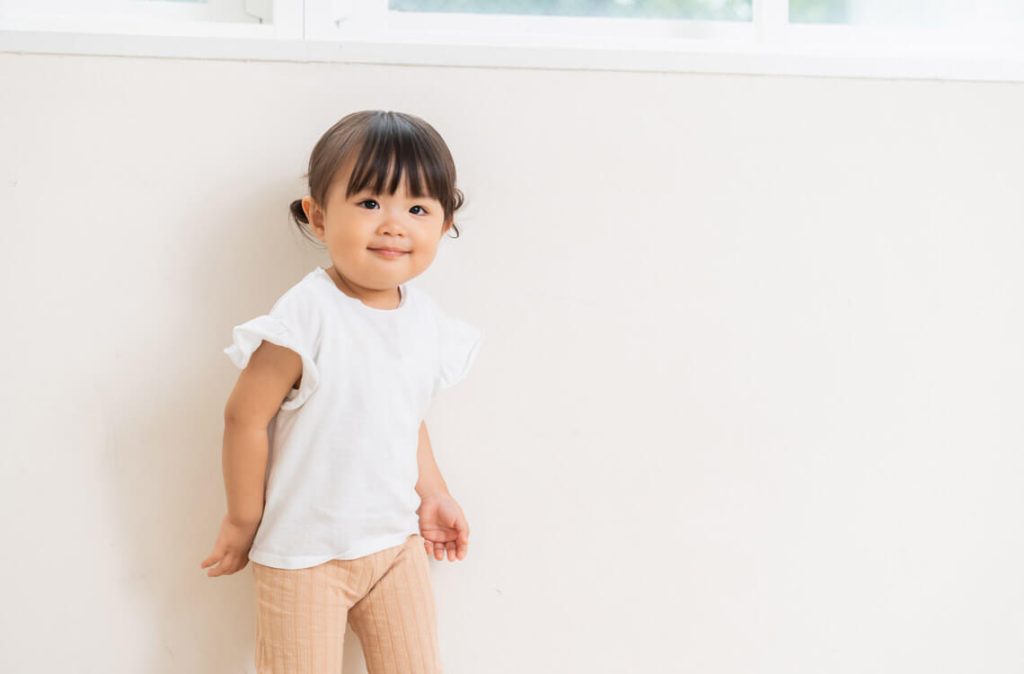Fourteen months feels lively for both you and your little one. Their 14-month-old developmental milestones involve lots of energy and a growing curiosity that cannot be outmatched.
Your toddler is bolder and louder; you may even have trouble catching up to them now.
Children at this stage begin to test boundaries and practise new skills with joyful determination.
This month is all about refining movement, widening vocabulary, and growing social confidence.
Here’s what you need to know about your child’s 14-month-old developmental milestones.
Physical & Motor Milestones
Walking With Growing Confidence
By 14 months, many toddlers walk steadily and with more purpose. Their steps lengthen and balance improves with every tumble and try.
Some toddlers this age begin short bursts of running on soft surfaces. Expect sudden spurts of speed followed by quick sits on the floor.
Encourage barefoot play indoors to strengthen foot muscles and balance.
Push toys, stable boxes and gentle games are also great at building walking stamina.
Climbing, Carrying and Small Tasks
Climbing interest increases at this age. Toddlers pull up on sofas, scale cushions, and explore low steps.
Your little one may begin to carry toys while moving from room to room. Squatting to pick up objects and then standing up again becomes smoother.
Fine control improves too; your little one is now able to turn simple knobs and open lids. Offer safe, low-risk climbing opportunities and supervise closely.
Communication & Cognitive Development
Words, Phrases and Gestures
Vocabulary usually expands now. Many toddlers use several recognisable words. Some start stringing simple two-word phrases like “more milk”.
Pointing, shaking the head and waving are strong communication tools.
Responding and repeating their words teaches meaning and rhythm. Name objects clearly during play to boost recognition and recall.
Problem Solving and Imitation
Cognitive curiosity deepens at 14 months. Toddlers experiment with cause and effect: push, pull, repeat.
They imitate household tasks like brushing or stirring a pot. Simple puzzles and stacking toys encourage early problem solving.
Hide-and-find games strengthen memory and attention.
Encourage exploration while offering gentle challenges just beyond reach.
Social & Emotional Development
Testing Limits and Seeking Praise
This age often brings testing behaviour and spirited refusal. Toddlers try out sharp no’s and stubborn tugs on boundaries.
They also seek praise and beam at approval. Offer clear, calm limits paired with lots of warm praise.
Small choices, “red cup or blue cup?”, help them feel in control.
Parallel Play and Early Sharing Attempts
Play is still largely parallel, but changes appear. Brief cooperative actions, such as handing back a toy, may occur.
Imitation is a key social tool now; copying builds connection.
Turn-taking remains hard, but guided practice helps. Model gentle exchanges and narrate simple social language.
Sensory & Perceptual Development
Tastes, Textures and Mealtimes
Many toddlers broaden their diet at this stage. They sample more textures and show clear preferences.
Mealtimes become sensory experiments: squishy, crunchy, wet, etc.
Offer a variety without pressure and expect messy exploration. Finger foods and soft pieces teach self-feeding and motor control.
Visual Detail and Listening Skills
Vision and spatial awareness sharpen noticeably at 14 months as well. You’ll find that your toddler is now able to judge distance more accurately when reaching for objects on a shelf, for instance.
They are now also able to respond to their name and familiar sounds across a room. Books with bold pictures keep their attention longer.
Songs with rhythm help memory and soothe mood swings.
When to Talk to a Paediatrician
Most toddlers develop at their own pace even at 14 months old. Still, consult a paediatrician if your child:
- cannot stand with support or take any steps.
- shows very limited babble or few gestures.
- rarely makes eye contact or interacts with others.
- appears unusually floppy or very stiff.
- has feeding difficulties or poor weight gain.
Early advice gives reassurance and options for support.
Expert Tips & Daily Activities
Movement and Balance Games
Create short obstacle courses with cushions and low boxes. Encourage stepping over soft objects and pulling up to stand.
Praise effort more than perfection to build boldness.
Language Through Routine
Narrate daily activities as much as you can when around your toddler. Name objects, describe actions, and sing repetitive songs.
Pause to let your toddler try words in return on their own, even if it sounds like gibberish.
Practical Play for Thinking
Use stacking cups, simple shape sorters and toy phones. Play hide-and-seek with a favourite toy to practise memory.
At this age, it’s important to rotate toys to keep novelty and curiosity alive.
Calm Routines and Sleep Cues
At 14 months old, you should start to maintain consistent naps and bedtime rituals for your little one.
Predictable routines are able to reduce tantrums and improve sleep.
A warm bath, a short story and soft music work wonders as a pre-bedtime ritual.
The Road Ahead
Your little one’s 14-month-old developmental milestones are full of new challenges. There will be spills, messes, and chaos.
But it is these moments that live in our memories forever.
Don’t forget to capture the tiny wins at this stage, no matter how small: a new word, steadier steps, or a shared laugh.
Your calm encouragement and steady presence make the biggest difference.
Disclaimer: The information provided in this article is for informational purposes only and should not be considered as medical advice from Motherhood. For any health-related concerns, it is advisable to consult with a qualified healthcare professional or medical practitioner.
For more insightful stories and fun recipes, stay tuned to Motherhood Story!
